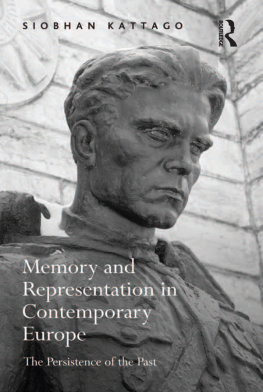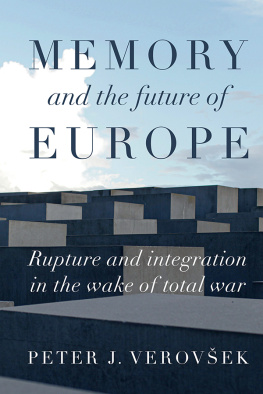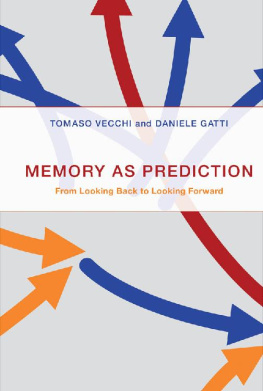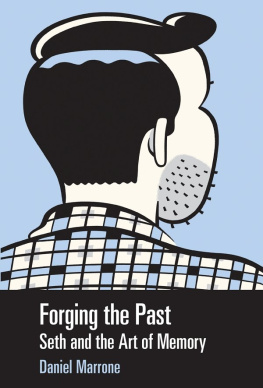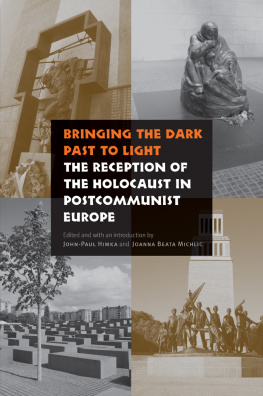MEMORY AND REPRESENTATION IN CONTEMPORARY EUROPE
To my parents,
Martin and Ann Murphy
Memory and Representation in Contemporary Europe
The Persistence of the Past
SIOBHAN KATTAGO
Tallinn University, Estonia
First published 2012 by Ashgate Publishing
Published 2016 by Routledge
2 Park Square, Milton Park, Abingdon, Oxon OX14 4RN
711 Third Avenue, New York, NY 10017, USA
Routledge is an imprint of the Taylor & Francis Group, an informa business
Copyright Siobhan Kattago 2012
Siobhan Kattago has asserted her right under the Copyright, Designs and Patents Act 1988, to be identified as the author of this work.
All rights reserved. No part of this book may be reprinted or reproduced or utilised in any form or by any electronic, mechanical, or other means, now known or hereafter invented, including photocopying and recording, or in any information storage or retrieval system, without permission in writing from the publishers.
Notice:
Product or corporate names may be trademarks or registered trademarks, and are used only for identification and explanation without intent to infringe.
British Library Cataloguing in Publication Data
Kattago, Siobhan, 1966-
Memory and representation in contemporary Europe : the
persistence of the past.
1. Collective memory--Europe. 2. Europe--History--1945
--Historiography. 3. Memory--Sociological aspects.
4. Memory--Political aspects. 5. Mental representation-
Europe.
I. Title
940.55-dc22
Library of Congress Cataloging-in-Publication Data
Kattago, Siobhan, 1966-
Memory and representation in contemporary Europe : the persistence of the past / by
Siobhan Kattago.
p. cm.
Includes bibliographical references and index.
ISBN 978-1-4094-3637-9 (hbk)
1. Collective memory--Europe. 2. Memorialization--Europe. 3. Representation
(Philosophy) I. Title.
D1053.K38 2011
940--dc23
2011027172
ISBN: 978-1-409-43637-9 (hbk)
ISBN: 978-1-315-59491-0 (ebk)
Contents
Preface
I am grateful for the institutional support of the department of Philosophy at the Estonian Institute of Humanities at Tallinn University and to funding from ETF Grant 8625: History as Cultural Memory: Toward an Estonian Mnemohistory. A sabbatical during the Fall semester 2010 enabled me to concentrate on writing. Students at Tallinn University provided an open forum for the discussion of collective memory in Europe. Likewise, students at the Tallinn University Summer School on How Collectivities Remember in 2007 and the Doctoral School in August 2010 at bo Akademi in Vasa, Finland were particularly helpful with discussions about modernity and memory.
The Slippery Slope of Memory (. I am very grateful to the editors of these publications for permission to republish this material here.
For comments on earlier drafts, discussions about the politics of memory in Europe and encouragement to write, my heartfelt thanks to Andrew Arato, Paul Blokker, Karsten Brggemann, Hubertus Buchstein, Benot Challand, Jeffrey Goldfarb, Jrg Hackmann, Andrew Hoskins, Tiina Kirss, Marko Lehti, Andres Luure, Peeter Mrsepp, Kristina Norman, Jeffrey K. Olick, Eva-Clarita Onken Pettai, Pille Petersoo, Klemen Slabin, Gesine Schwan, Marek Tamm, Rita Trimoniene, Raivo Vetik, Tnu Viik, and Vera Zolberg.
My parents and family have supported the idea of a book about European memory, throughout its different, winding phases. I am grateful to the editors at Ashgate Publishing for their help from beginning to end. This book could not have been completed without the close reading, humor and marvelous friendship of Johanna Sderholm.
Siobhan Kattago
Tallinn, 2011
Introduction
What then is time? If no one asks me, I know what it is. If I wish to explain to him who asks, me, I do not know. (St. Augustine)
Hardly a day goes by without some media coverage or commentary about the politicization of the past and the politics of memory. There seems to be no shortage of debates about how to represent the past to ourselves and to the next generation. The recent memory boom is visible in history museum debates, monuments, film and photography, commemorations, political speeches and tourism. Academic studies of memory abound in sociology, philosophy, literature, cultural studies and history. Whether one looks at commemorations of the Second World War, debates over appropriate Holocaust memorials or public apologies for national paststhe issue of memory seems to have an obsessive hold on the public imagination. Are we experiencing more memory now than before or has the mass media simply made us more aware of the recent past? My sense is that the interest in memory is more than an academic trend or a new way of talking about history. Indeed, the politicization of the past is linked to modern perceptions of time and identity. While our backward glance may be seen as a response to the uncertainties of the future, it has deeper roots in modern conceptions of time. To my mind, there at least three reasons for the centrality of memory in contemporary culture: 1) the modern acceleration of time 2) shift from hard to liquid modernity entailing greater interest in the past and 3) the growing importance of the mass media in everyday life.
The Modern Acceleration of Time
The modern break with tradition, democratization of history, secularization of society and distinction between community and society are among just a few of the phrases associated with modernity. Complementing Pierre Noras idea of the modern acceleration of history, the German historian, Reinhart Koselleck emphasizes how the break with pre-modernity entails a qualitative shift in our understanding of time (Nora 1996, Koselleck 1985). Beginning with the French Revolution, a different sense of future emerged. While medieval time was predominantly cyclical and contained the Messianic promise of redemption, modern time is open-ended and anticipates an ever accelerating future. The shift to modernity means that time is no longer simply the medium in which all histories take place; it gains a historical quality (Koselleck 1985: 246). Modernity accompanies a shift in our perception of time and historical consciousness. Heralding a kind of new time (Neuzeit), modernity brings about a reversal of the structure of time enabling the future to become increasingly more important than the past. Since the Enlightenment and the French Revolution, belief in progress and the infinite perfectibility of science have become modern creeds that we often take for granted.
Acceleration, initially perceived in terms of an apocalyptic expectation of temporal abbreviation heralding the Last Judgment, transformed itself also from the mid-eighteenth century into a concept of historical hope. (Ibid., 36-37)
Kosellecks semantics of historical time is part of his lifelong project, the Geschichtliche Begriffsgeschichte (the historical history of concepts) (Brunner ed. 1972-1993). Expressing more than a lexicon of historical concepts, Begriffsgeschichte is a method of historical understanding. The purpose of his project is to examine the dissolution of the old world and the emergence of the new in terms of the historicoconceptual comprehension of this process (Koselleck quoted in Tribe 1985: xi). By studying the Sattelzeit or dawn of modernity, Koselleck is able to gain insight into modern historical consciousness and temporality. Influenced by Gadamers philosophical hermeneutics, he examines how historical consciousness is shaped by the cultural and historical traditions that we are born into. For Gadamer, history does not belong to us, but we belong to it (Gadamer 1975: 277). Koselleck interprets Gadamers retrieval of tradition as a starting point for exposing the contradictions and ruptures within ones own lived tradition. In many ways, Kosellecks work focuses on a central question:

